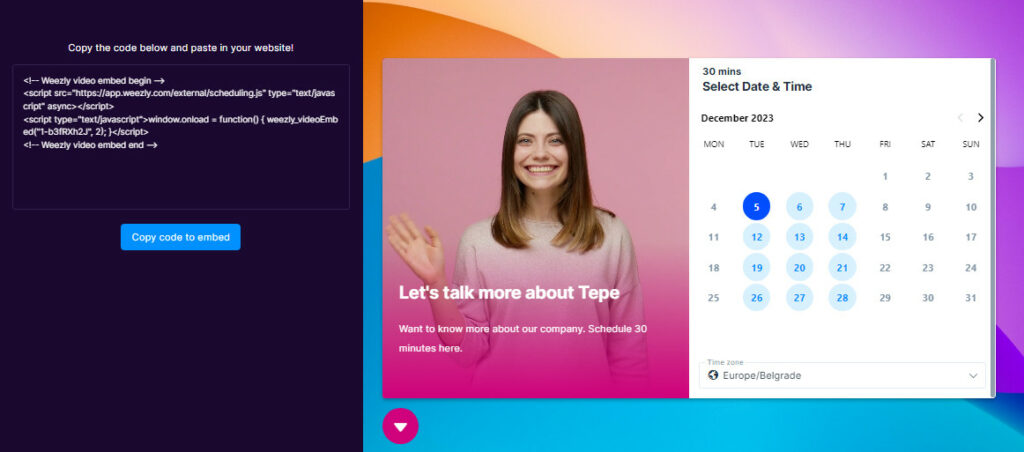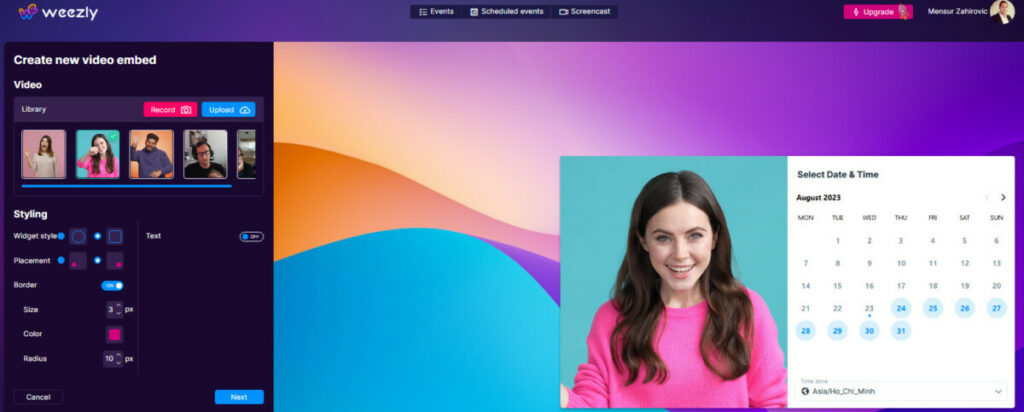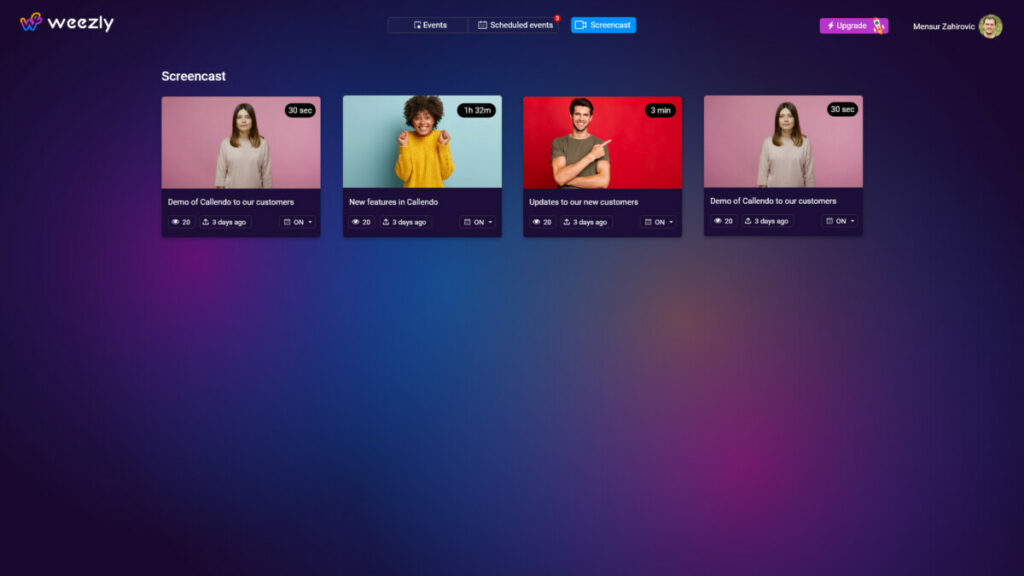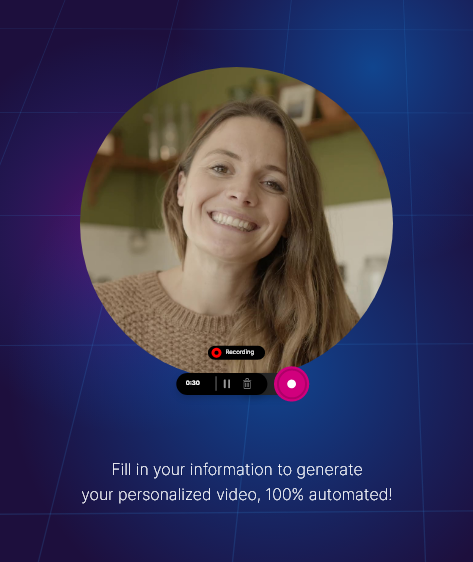In today’s fast-paced digital age, efficiency and convenience are key priorities for businesses and individuals alike. One area where these priorities intersect is scheduling, and the use of scheduling via video widgets is a prime example. These widgets have revolutionized the way we manage our time and appointments, making the scheduling process smoother and more interactive. In this comprehensive guide, we’ll delve into the world of scheduling via video widgets, exploring their benefits, implementation, and best practices.

Understanding Scheduling via Video Widgets
Before we dive into the details, let’s establish a clear understanding of what scheduling via video widgets entails. At its core, scheduling via video widgets involves the integration of video conferencing capabilities into scheduling and appointment booking systems. It allows users to seamlessly schedule appointments, consultations, or meetings while simultaneously setting up a video conference for the chosen time slot. This technology has gained popularity across various industries for a multitude of reasons.
Benefits of Scheduling via Video Widgets
The adoption of scheduling via video widgets offers a myriad of advantages, making it an attractive solution for businesses and individuals alike. Let’s explore some of these benefits:
1. Convenience and Efficiency
Scheduling via video widgets eliminates the need for back-and-forth email exchanges or phone calls to set up appointments. Users can view real-time availability and choose a time slot that suits them, all in one interface.
2. Time and Cost Savings
By automating the scheduling process and integrating video conferencing, businesses can save valuable time and reduce administrative overhead. There’s no need to manually coordinate schedules or send out meeting invitations.
3. Increased Engagement
Video conferencing adds a personal touch to appointments and meetings, enhancing engagement and enabling face-to-face interactions regardless of physical location. This is particularly valuable for remote teams and clients.

4. Enhanced Client Experience
For businesses offering services or consultations, scheduling via video widgets improves the client experience. Clients can book appointments at their convenience and receive automated reminders.
5. Integration with Calendars
Most scheduling via video widgets seamlessly integrates with popular calendar applications like Google Calendar and Outlook, ensuring that appointments are automatically synced with users’ schedules.
6. Analytics and Data Insights
Businesses can gain valuable insights into their scheduling patterns and customer behavior through the analytics provided by scheduling via video widgets. This data can inform decision-making and optimize appointment availability.
Implementing Scheduling via Video Widgets
Now that we’ve established the advantages, let’s explore how to implement this option effectively.
1. Choose the Right Scheduling Platform
Selecting a reliable scheduling platform with video integration capabilities is the first step. Some popular options such as Weezly. Consider factors such as user-friendliness, pricing, and integration options when making your choice.
2. Set Up Your Account
After choosing a platform, create an account and configure your settings. Customize your availability, appointment types, and durations to align with your business needs.
3. Integrate Video Conferencing
Enable the video conferencing feature within your scheduling platform. Most platforms offer integrations with popular video conferencing tools like Zoom, Microsoft Teams, or Google Meet.
4. Define Appointment Types
Determine the various types of appointments or meetings you offer, such as consultations, interviews, or support sessions. Each appointment type may have unique settings and requirements.
5. Configure Notifications
Set up automated notifications to remind both you and your clients about upcoming appointments. These notifications can be sent via email or SMS and typically include the meeting link.
6. Make or Add Your Video
When incorporating a new widget, you will be prompted to input the video properties, including the title, optional description, callback URL, color theme selection, cancellation option, and more.

6. Share Your Scheduling Link
Share your scheduling link on your website, social media profiles, email signature, or any other customer touchpoints. Make it as accessible as possible for clients and colleagues to book appointments with you.
7. Monitor and Optimize
Regularly review your scheduling analytics to identify trends and areas for improvement. Adjust your availability and appointment types based on client demand and preferences.
SEE MORE: How To Create a Video Widget in Weezly: Step-by-Step
Best Practices for Scheduling via Video Widgets
To make the most of scheduling via video widgets, consider these best practices:
1. Keep Availability Up-to-Date
Ensure that your availability accurately reflects your schedule. Cancel or reschedule appointments promptly to avoid client inconvenience.
2. Offer Flexibility
Provide a range of appointment times to accommodate clients in different time zones or with varying schedules. Offer evening or weekend slots if possible.
3. Set Clear Expectations
Clearly communicate any preparation or requirements for the video meeting to clients when they book appointments. This includes sharing any documents or materials they should review beforehand.
4. Test the Technology
Before each video appointment, test the video conferencing technology to avoid technical glitches during the meeting. Ensure that your camera, microphone, and internet connection are working smoothly.
5. Record Meetings (with Consent)
With client consent, consider recording video meetings for future reference or for clients who may have missed the session. Always inform participants that the meeting is being recorded.
6. Collect Feedback
Gather feedback from clients and colleagues about their scheduling and video meeting experiences. Use this feedback to make continuous improvements.
Security and Privacy Considerations
While scheduling via video widgets offers many benefits, it’s essential to prioritize security and privacy. Here are some key considerations:
1. Data Encryption
Ensure that your chosen video conferencing platform uses encryption to protect sensitive data exchanged during meetings.
2. Authentication
Implement authentication measures to verify the identity of participants and prevent unauthorized access to video meetings.
3. Privacy Policies
Review the privacy policies of your scheduling and video conferencing platforms to understand how they handle and protect user data.
4. Compliance
Ensure that your scheduling and video conferencing practices comply with relevant data protection regulations, such as GDPR or HIPAA, depending on your industry.
SEE MORE: Let’s Explore Weezly’s Video Widget

The Future of Scheduling via Video Widgets with Weezly
As technology continues to advance, scheduling via video widgets is likely to become even more integrated into our daily lives. Expect to see further automation, enhanced customization options, and tighter security measures in the future. Businesses that embrace this technology will continue to enjoy increased efficiency and improved customer satisfaction.
In conclusion
Scheduling via video widgets is a game-changer for businesses and individuals seeking to streamline their appointment and meeting management processes. By choosing the right platform, implementing best practices, and prioritizing security, you can harness the full potential of this innovative technology to boost productivity and enhance customer experiences.
With the convenience and efficiency it brings, scheduling via video widgets is undoubtedly a trend to watch in the ever-evolving landscape of digital communication and collaboration.







